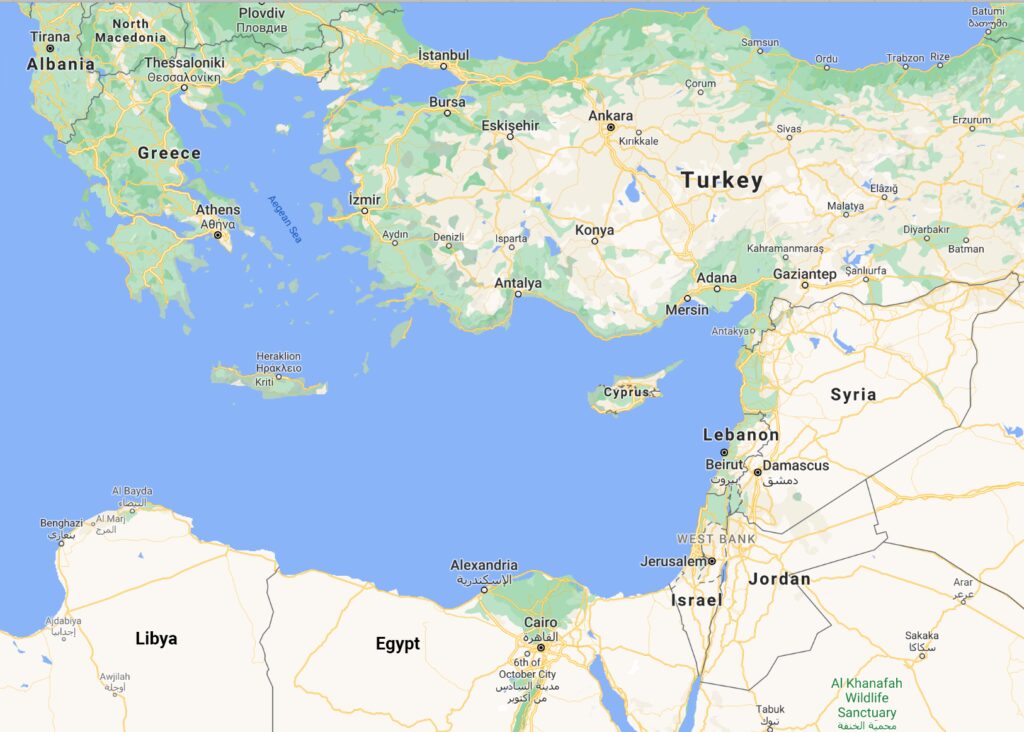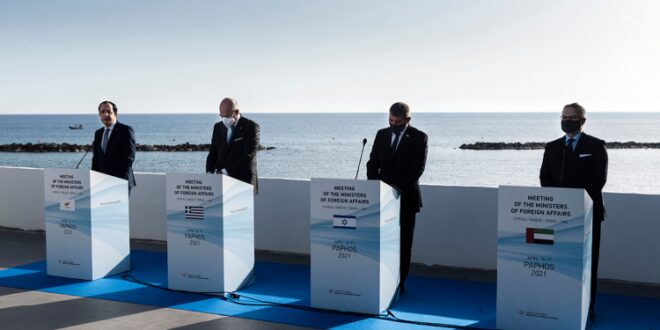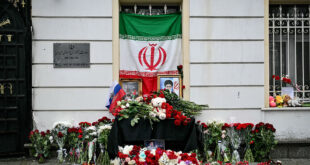The synergies between the Gulf and the eastern Mediterranean theaters have grown substantially in recent years. Speaking at a meeting in Paphos, Cyprus in mid-April 2021 with his counterparts from Greece and Israel, as well as the former minister of state for foreign affairs of the UAE (now an advisor to the UAE president), the Cypriot foreign minister noted, “The evolving web of regional cooperation is creating a new narrative.” A week later, UAE and Israeli fighter jets flew together publicly — for the first time — in an international aerial exercise hosted by Greece. How can we explain the signs of growing cooperation between these actors that seemingly operate in close but not completely overlapping arenas?
Developments ranging from the Libyan civil war to the Abraham Accords have created a space in which the interests of eastern Mediterranean states, such as Greece, Cyprus, Egypt, and Israel, and Gulf states, like the UAE and Saudi Arabia, seem more aligned than ever before. Seemingly unrelated developments in areas like the energy sector are now interlinked in ways that further solidify the interdependence of the two regions. Moreover, these countries’ relations with Israel are no longer seen as an obstacle to deepening ties. On the contrary, Israel, because of its location and military and technological strength, and as a result of shared interests, is now a desired partner in these blossoming relationships.

The growing cooperation between Israel, Greece, and Cyprus preceded that of the Hellenic and Arab Gulf states. In the past, Israel had difficult relations with Greece and Cyprus because of their desire to have the Arab world on their side with regard to the Cyprus question and due to the sensitive issue of the Copts in Egypt. In addition, the golden era of Turkish-Israel relations pushed these countries away from each other. Beginning as early as 2010, however, against the backdrop of the deterioration in Turkey-Israeli relations following the Mavi Marmara incident, natural gas discoveries in the eastern Mediterranean, and the Greek debt crisis (which also resulted in an economic crisis in Cyprus), relations began to flourish. Much of the same can be said of the Greece-Cyprus-Egypt triangle that started to take shape in its current form after the rise to power of Egyptian President Abdel-Fattah el-Sisi in 2014, and whose relations with Turkey were also extremely tense.
The past year saw a major step forward in political and security cooperation between Saudi Arabia and the UAE on the one hand and Greece and Cyprus on the other. In March 2021, Saudi fighter jets and transport planes flew to Greece to participate in Falcon Eye 1, a large-scale joint military exercise that was first of its kind for the two air forces. At the same time, a Saudi military delegation headed by Chief of Staff Lt. Gen. Fayyad bin Hamad al-Ruwaili arrived in Greece for talks. In April the two countries even agreed that Greece would loan Patriot missile units to Saudi Arabia to help protect critical infrastructure against attacks, mainly from Houthis forces in Yemen. Greece strongly condemned these attacks, although following Iranian objections, it emphasized that the systems were defensive and had no offensive capabilities. Riyadh will reportedly not only finance the deployment of the systems and the teams, but will also upgrade the systems for Greece.
Relations between the UAE and Greece have warmed to an even greater extent. In August 2020, one week after the announcement of the normalization agreement between Israel and the UAE, Abu Dhabi sent fighter jets and ground crews to Greece to participate in a joint exercise by the two air forces. In November 2020, during a visit to Abu Dhabi by the Greek prime minister, the two countries signed a major strategic partnership agreement that reportedly includes a significant security component.
High-level political meetings have also joined the security cooperation efforts. In May 2020, following a meeting on a virtual platform, the foreign ministers of Greece, Cyprus, Egypt, the UAE, and France issued a joint statement condemning the dispatch of Turkish drilling ships to waters in Cyprus’s exclusive economic zone. In February 2021, Greece held a summit attended by the foreign ministers of Cyprus, the UAE, Saudi Arabia, Bahrain, Egypt, and France. The abovementioned mid-April 2021 meeting in Paphos was notable as it seemed to herald the formation of a new “square” relationship of Greece, Cyprus, Israel, and the UAE.
Shared interests
In recent years, Riyadh and Abu Dhabi have considered ways of deepening the cooperation between them and other countries alarmed by Turkish assertiveness, especially in the Mediterranean and the Red Sea, with the aim of expanding the boundaries of their influence and involvement. Ankara, Riyadh, and Abu Dhabi have competed with each other to shape the regional order following the upheaval in the Middle East that began a decade ago. Most importantly, the UAE and Saudi Arabia support Sisi’s regime in Egypt in their broader struggle against the Muslim Brotherhood movement.
Since 2017, the Turkish military base in Qatar has also been an ongoing source of tension between Riyadh, Abu Dhabi, and Ankara. All three countries began intervening in theaters marked by instability and power vacuums far removed from their own borders. The involvement of various actors in the civil war in Libya and other such developments has had a substantial impact on events in the eastern Mediterranean. In addition to the construction of military bases, ports, and support for proxies, the countries have tried to form alignments, albeit loose ones, to promote their interests. Similar motives also contributed to the normalization agreement between Israel and the UAE, which regard Ankara as a geostrategic rival, and in the case of Abu Dhabi, as an ideological one as well. These developments fit in well with diplomatic initiatives by Cyprus and Greece involving the eastern Mediterranean that aim to compensate for their relative military weakness vis-à-vis Turkey.
Like the talks and meetings between senior figures on both sides that are occurring with increasing frequency, the air exercises are more designed to show the Gulf’s support and solidarity with Greece than to test the fitness of the countries’ militaries, given the significant increase in tensions in the eastern Mediterranean in 2020, and to signal to Ankara an alignment of countries determined to obstruct its assertive policy. References to Israel in reports of growing cooperation between Greece and the Gulf countries are not infrequent. The UAE and Israel also took part in an international air exercise in Greece this April, and in contrast to previous years, Abu Dhabi allowed its participation in an exercise together with Israel to be public.
The significant strengthening of the geopolitical aspect of ties between the Gulf states and Greece is something that has occurred only in the past few years. Previously, the connection between the Gulf and the eastern Mediterranean was based primarily on economics and trade, albeit on a fairly limited scale. Bilateral trade between Saudi Arabia and Greece totaled approximately $1 billion in 2020, while that between Greece and the UAE was around $400 million in 2019. For the sake of comparison, bilateral trade between Turkey and Saudi Arabia totaled approximately $5 billion, and that between Turkey and the UAE came to around $7 billion in 2018.
In terms of energy, the gas discoveries in the eastern Mediterranean have prompted Cyprus, Greece, Israel, and Egypt to strengthen their cooperation, as best exemplified by the establishment of the East Mediterranean Gas Forum (EMGF) in 2019. The UAE wished to join the EMGF in 2021 as an observer, but was blocked by a Palestinian veto, in a protest by Ramallah over the Abraham Accords. An agreement to build the Eastern Mediterranean (East Med) pipeline, running from the gas fields off Israel’s shores through Cyprus and Greece to Europe, was signed in 2020 and ratified by the signatories. However, the plans to build what would be longest and deepest subsea gas export pipeline were overly ambitious to begin with and the Turkey-Libyan Government of National Accord (GNA) maritime delimitation agreement from 2019 seems to have complicated matters further, as the pipeline would run through contested waters. Changes to the route have been discussed, but the new route will still likely cause discontent in Ankara. Another area where both theaters converge is the export of oil from the Gulf through the Mediterranean. While this has long been done through the Suez Canal, an agreement was signed in 2020 for the export of oil from the UAE through Israel. In another interesting twist, a UAE company has bought shares in a Israeli firm involved in one of the country’s offshore natural gas fields. This adds to the already existing holdings of the Greek-owned company Energean in some of Israel’s natural gas discoveries.
In many respects, Abu Dhabi’s tension with Ankara has made the UAE Greece’s closest Arab partner. Athens supports Abu Dhabi’s efforts in Syria, and in Libya it conducted a dialogue with Gen. Khalifa Hifter, who has been supported by the UAE, at least until recently. For their part, by strengthening their ties with Greece (and with France, which is also in the anti-Turkey camp), the UAE and Saudi Arabia strive to not only counter Turkey’s growing assertiveness, but also to achieve closer and stronger ties with the EU. This has been a clear Israeli interest as well with regard to its relations with Greece and Cyprus: to have EU countries block or soften decisions that are seen in Jerusalem as anti-Israel.
The closer relations between several Gulf countries and Greece come at a time when Turkey is trying to adjust its foreign policy following Joe Biden’s election as president. These efforts are underway with Saudi Arabia, the UAE, Egypt, and Greece, and are accompanied by a certain degree of pragmatism by Turkey, which has declared its desire to restore proper relations with these countries. A similar attempt was made to normalize relations with Israel, but these efforts were halted in the context of the escalating violence between Israel and the Palestinians in May 2021. Moreover, Ankara finds it difficult to prove that its efforts to jumpstart relations are sincere, and that its motive is not merely to break up the alignment of countries arrayed against it.
Conclusion: A permanent formation?
Although the permanence and binding nature of this emerging inter-regional formation is questionable, it is possible, especially given the defense agreement signed by the UAE and Greece, that the parties expect aid and support from each other for their respective interests and needs, including economic ones. The military power of the UAE and Saudi Arabia is insufficient to change the balance of power between Greece and Turkey in the eastern Mediterranean, and Greece’s military contribution to the defense of the Arabian Peninsula is also negligible.
Defense relations between Israel, Greece, and Cyprus have significantly strengthened but are unlikely to ever result in a defensive alliance. The Israeli air force frequently trains in Greek and Cypriot air space, the different navies conduct joint drills, and Israeli commando forces train in Cyprus in a mountainous terrain that resembles Lebanon. Major defense procurement deals, such as the flight school in Greece that will be operated by an Israeli defense company, and the joint development of the future corvettes for the Greek navy are also signs of growing cooperation. A notable development in the intelligence realm is the radar in Crete that Israel and Greece are jointly working on.
Even if it is temporary and nonbinding in nature, this new inter-regional formation has considerable political significance, because it increases Ankara’s isolation and forces it to reconsider its regional policy. While statements by decision makers from various countries have mentioned on more than one occasion that the informal alignment’s purpose goes beyond any one specific threat and that it is designed to bolster regional stability, without Turkey’s assertive actions, it is doubtful whether relations would have reached this level.
The strategic motives that have led several Gulf states to increase their involvement in the eastern Mediterranean in recent years are to a large extent dependent on circumstances and are thus temporary. For example, the changes and adjustments in Turkish and U.S. policy in the region will certainly affect the Gulf states’ need for a military presence in a remote theater. Turkey has already begun to send out feelers to Saudi Arabia, Israel, Egypt, and the UAE in an attempt to improve relations. Should Ankara pursue a more enduring retreat from its assertive policies, this would contribute to looser future relations between the Hellenic countries and the Gulf states. In addition, if the U.S. succeeds in balancing its desire to reduce its involvement in the Middle East and the need to make clear to its regional allies that it is not abandoning them, the latter’s interest in taking independent action will wane. Since the current trends in the region seem to be running in the opposite direction, however, and given the strategic balance and shared negative attitude toward Turkey, what is now temporary may become permanent, and the emerging Hellenic-Gulf alignment, with the support of Israel and Egypt, may take root.
While all the actors have an interest in restraining Turkey’s assertive policy in the region, some, such as Cyprus and the UAE, have been more active than others. Israel’s Hellenic and Gulf partners may like to see more active involvement on Israel’s part in countering Turkey, but Israel’s geographic proximity to the focus of the tension between Greece and Turkey requires great caution on its part. This is particularly true given that there are more significant strategic challenges facing Israel from Jerusalem’s perspective, above all Iran. For example, in commenting on the Paphos meeting, Israeli Minister of Foreign Affairs Gabi Ashkenazi emphasized the threat posed by Iran and Hezbollah. In addition, the strengthening of relations between Israel, its Hellenic partners, and the Gulf states is also dependent on the direction Israel’s relations with the Palestinians take. While these relationships can absorb temporary flare-ups, as also erupted in May 2021, if the violence is sustained, this might make it highly problematic for these actors to maintain their relations with Israel at the same level.
 Eurasia Press & News
Eurasia Press & News




